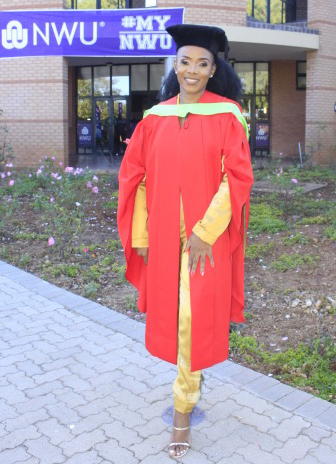“My passion for rural development started when I realised that there are families who go to bed without food. I became more interested through my research on key strategies and interventions that can assist the country on how rural development can be best implemented to ensure that food is secure and rural areas are developed,” says Dr Maria Mphahlele, North-West University (NWU) PhD graduate.
Aligning her PhD study with her passion, Dr Mphahlele investigated the risks in rural development service-delivery models in South Africa and looked at how these risks can be managed effectively.
Rural development models in South Africa emerged from socio-political transformation and discussions on how to restructure the local economy, she says. Historical trends also show that different programmes, for example, the Reconstruction and Development Programme (RDP), the Rural Development Framework (RDF), the Integrated Sustainable and Rural Development Strategy (ISRD) and the Comprehensive Rural Development Programme (CRDP), were introduced to deal with the development of rural areas. When observing the current trends in the country, there is no doubt that the government has achieved some degree of success in certain areas, but it has not achieved its objective of transforming rural areas through various models.
As part of her PhD, Dr Mphahlele developed two models for rural development service delivery in South Africa. The first model is called the RAKE model. This model is proposed by the study that the government should utilise to execute the function of rural development in the country. It is called the RAKE model because it allows rural development to be implemented parallel to the priorities of the national government – again it is implemented by the key expectations.
The second model, called the integrated extension and rural development model, is proposed to be a service-delivery model that can be utilised in agriculture to bridge the existing gap that has been identified from the research study. Agriculture is one of the clusters that fall under the economic transformation priority.
Therefore, the model allows extension programmes to be the foot soldiers of rural development in agriculture. This model ensures that projects, programmes and any key interventions of rural development are implemented effectively and efficiently in a well-coordinated manner within the scope of the agricultural sector.
The findings of her research study showed that the rural development service-delivery model is exposed to several risks (such as poor coordination, duplication of services, conflict among stakeholders, etc.) posed by both the implementers and recipients. She recommends a review of rural development policy to avoid and prevent these risks.
‘‘This study will assist in improving coordination and collaboration among the government and other stakeholders by creating functional coordination mechanisms to achieve maximum development benefits in rural areas,” says Dr Mphahlele.
She also hopes to use her findings to raise awareness of the risks that need to be considered and to deepen understanding of the risk management process in rural development.
About the researcher
Dr Mphahlele is an agricultural specialist with a master’s degree in agriculture from the University of Limpopo. She recently graduated with a doctorate in Agriculture from the NWU.
She has postgraduate certificates from the following institutions: German Development Institute, Regenesys Business School, University of Pretoria, Korea Institute for Rural Development (South Korea) and the University of Hong Kong Clinical Trial Centre (China). She has extensive experience in the agricultural sector, community development and land reform.

Dr Maria Mphahlele is an agricultural specialist who recently graduated with a doctorate in Agriculture from the NWU.
